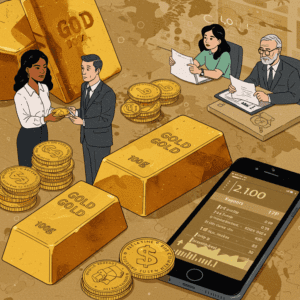The constant rising inflation has completely spooked the stock market and its investors throughout the U.S. It has been a historic spike in inflation that could be reversed in time, but it could also stay for the longer term.
Retirees that live on fixed incomes are definitely worrying right now that rising prices might upset their well-laid retirement plans.
And according to a specific survey by Global Atlantic Financial Group, 61% of investors who are at the age of retirement believe now that low-interest rates and rising inflation will make things even harder to create an income stream that could last for a lifetime.
So if you’re wondering what is there to do now that inflation is rising, here’s what you need to know:

Inflation and retirement
It’s extremely easy to tell a very scary story about inflation and retirement. For example, let’s take someone who was $1 million saved for retirement, and who expects to spend approximately $50,000 a year.
Assuming that 3% of annual inflation is a steady 3% rate of return, that $1 million would only last for 20 years. However, if the inflation rose to 12% annually, $1 million would run out in only 11 years and nine months.
And trust me, it’s a perfect reason to be completely freaking out! Even if the times were normal, anyone out there who’s planning for retirement or has retired already would still worry about running out of money.
The potential of an increase in prices is only added to the baseline of anxiety. So even for people with the best-laid plans, inflation is still that scary factor that complicates everything. After all, inflation is the worst enemy of a fixed income.
Don’t let the previous inflation cloud your judgment
If you’re 65 years today, it means that you were 25 when the average annual inflation in the U.S. reached 14%. And like many other Depression-era children who lived their lives completely scarred by that experience, anytime another similar shock might come around the corner, people who lived those times are living in constant fear of a possible return to double-digit inflation.
But according to a medical doctor and retirement planning expert, you shouldn’t be afraid. According to Carolyn McClanahan, “inflation might be an issue, yes, but it may not be as big an issue as people think.
The real reason there’s inflation is not that there is too much money. It is because there is too much money that chases too few goods.”
It will take a very long time before the American economy will fully recover from the impact of Covid, and there are still fewer jobs than there were pre-pandemic, and also the ranks of small businesses are forced due to the ongoing effects of Covid-19.

Don’t panic about inflation – but make sure you also don’t ignore it
The U.S. economy has suffered mild inflation in the past, which was on average $3 annually. Even if that’s a modest number, you can’t really ignore it.
Even 3% over 25 years signifies that the price of goods will double during that span. What’s truly relevant about all this is that the buying power of someone who retires on a fixed income and is 65 years old will be cut in half by the time they reach 90.
And even worse, that’s only half of the story. Lots of observers believe that Uncle Sam fudges the official inflation numbers a little bit, as an effort to keep down government expenses, such as Social Security, that is tied to the inflation rate.
That’s one of the reasons why price hikes might feel worse than the 1.4% CPI inflation rate that’s published by the Bureau of Labor Statistics in 2021.
Keep a steady hand and save where you can
If you are truly worried about running out of money, try not to overcompensate. Also, try not to imagine that you can beat high inflation just by betting on all sorts of risky real estate or eye-catching new tech industries because you are more likely to lose what you already have than to win something.
McClanahan also pointed out that “with inflation, you might also get a rise in interest rates to compensate.” This will benefit people who have cash.
In this kind of environment, traditional retirement planning hacks such as laddering certificates of deposit (CDs), which will mature and roll over on a staggered basis, will only act as a solid hedge.
That’s mainly because interest rates on CDs, just like savings accounts and money market funds will closely follow inflation.
Consumer savings interest rates are enormous now, but some ’70s kids out there might remember 15% rates from those times, when inflation was much higher. That should provide some kind of comfort.

Invest beyond your savings account
It’s still unlikely for savings interest rates to exceed inflation, and even well-placed cash might erode in value. Savers have to take on some kinds of risks.
Lots of retirees out there don’t really understand that at the age of 65 years old, they might still need to invest money for the next 20 or 30 years, which means they should keep their money in the stock market.
“Stocks over time will do a much better job of outpacing inflation.” according to a financial expert. The 100-year track record for inflation pegs it at 3%, and in the meantime S&P 500 is earning about 7% every year, accounting for inflation.
All these numbers are supposed to provide some sort of comfort to those people who worry about inflation. “You are going to be an investor throughout your retirement. The money is your best longevity insurance.” according to Weston.
Be flexible so you can cope with it
The way people spend their money during retirement is constantly changing, according to McClanahan. While they might spend more money on travel when they’re in their late 60s, as years go by, they spend less and less.
Inflation could impact certain areas of spending more than others, and seniors can adjust on the fly if they’re willing to be flexible.
Moving to a certain area with cheaper real estate taxes could help, but so could driving less if gasoline prices will spike.
Let Social Security help you
People love knocking it, but Social Security is still one of the major parts of most Americans’ retirement. Half of the retirees rely on Social Security for nothing less than 50% of their retirement income.
It comes with a built-in cost of living increase that’s based on the published inflation rate. Even if there are tons of written things and ideas about a potential dry-up of the Social Security trust fund, it’s still estimated to provide a minimum of 70% of expected benefits when it will run out of cash, WITHOUT any other legislative changes.
Get rid of debt
So for many people out there who are current investors, real estate tax inflation is definitely their biggest concern. But it should be a debt load instead.
A record number of older Americans might still have a couple of mortgages, credit card debt, and even some student loans. This kind of debt will be an anchor as inflation is rising.
If it’s adjustable-rate debt, let’s say a mortgage that isn’t at a fixed rate, any inflation at all could signify a real disaster. That’s why paying off debt is definitely a top priority for anyone who’s worrying about late-in-life inflation.
Keep working after retiring
The best way to preserve your capital is to keep on earning. Every single dollar you earn during your golden years is a dollar that you won’t have to withdraw.
This is why your biggest hedge against inflation is definitely your human capital.
If you want to learn other things about retirement saving, we recommend you read this book: How Much Money Do I Need to Retire?: Uncommon Financial Planning Wisdom for a Stress-Free Retirement (Financial Freedom for Smart People). It is probably one of the best books to have near you when navigating unknown retirement questions.
If you enjoyed reading this article, we also recommend reading: Big Retirement Fears? 5 Things You Probably Didn’t Consider Enough

















